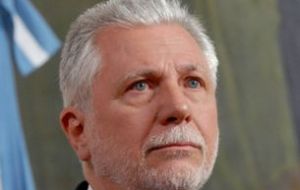MercoPress. South Atlantic News Agency
Argentina does not rule out Brazil in the River Uruguay joint monitoring
 Deputy Foreign Minister Victorio Taccetti
Deputy Foreign Minister Victorio Taccetti Argentina’s Deputy Foreign Minister Victorio Taccetti did not rule out the possibility of Brazil integrating the joint environmental monitoring of the River Uruguay currently being arranged by President Cristina Fernández de Kirchner and her Uruguayan counterpart José Mujica.
“It is important to look at these matters from a regional point of view is important because natural resources are not bound by man-made borders,” he explained.
In order to add Brazil to the equation, it would be necessary to “create a new norm or a new agreement and take it from there,” Mr. Taccetti added.
The joint monitoring is part of an overall agreement that should put an end to a diplomatic rift between the neighbouring countries over the construction of a pulp mill on the Uruguayan side, which originally Argentina alleged was contaminating, a stance taken by Argentine pickets that have since 2006, being blocking a bridge linking the two counties.
“The decision to end the roadblocks clears the air between both countries and helps create the joint monitoring in tangible manner,” he said.
According to Taccetti, the monitoring is based in a “bilateral norm which was a pioneer in environmental international law,” known as the River Uruguay treaty and signed by both countries in 1975.“
”The idea of a joint monitoring will be evaluated by both presidents, based on what the corresponding Foreign Ministers have been discussing lately,“ he concluded.
Meantime in Gualeguaychú, stronghold of the activists against the Botnia/UPM pulp mill across the bridge in Fray Bentos, there was confusion following Uruguayan president initiative to have Brazil in the joint monitoring. Mujica argued that the environmental monitoring should cover the whole extent of the river Uruguay, which is born in the Brazilian hinterland.
Gualeguaychú Mayor Juan José Bahillo stated he ”does not understand what Brazil's role will be in the Botnia paper mill's joint environmental monitoring,“ although he added he was ”happy that President Mujica finally understood where the root of the problem was“.
”I don't understand the Uruguayan suggestion to include Brazil in the joint environmental tests, or what responsibility Mujica is expecting to give them,“ Mr. Bahillo stated.
He then added that ”it is one thing to talk about the river as a whole, where I think Brazil should be included, but the Botnia matter is inherent only to Argentina and Uruguay.“
However, he highlighted that ”one of the problems was the Uruguayan position, which has now softened,“ and praised Mujica's new attitude because it will ”allow fort hem to move forward in their efforts to solve the conflict“.
”Our biggest problem had been the intransigent Uruguayan authorities,“ he remarked.
Starting Saturday at 1pm, ”traffic will return to normal and this will allow for a gradual return to the bonds we have with Uruguay.”




Top Comments
Disclaimer & comment rulesCommenting for this story is now closed.
If you have a Facebook account, become a fan and comment on our Facebook Page!